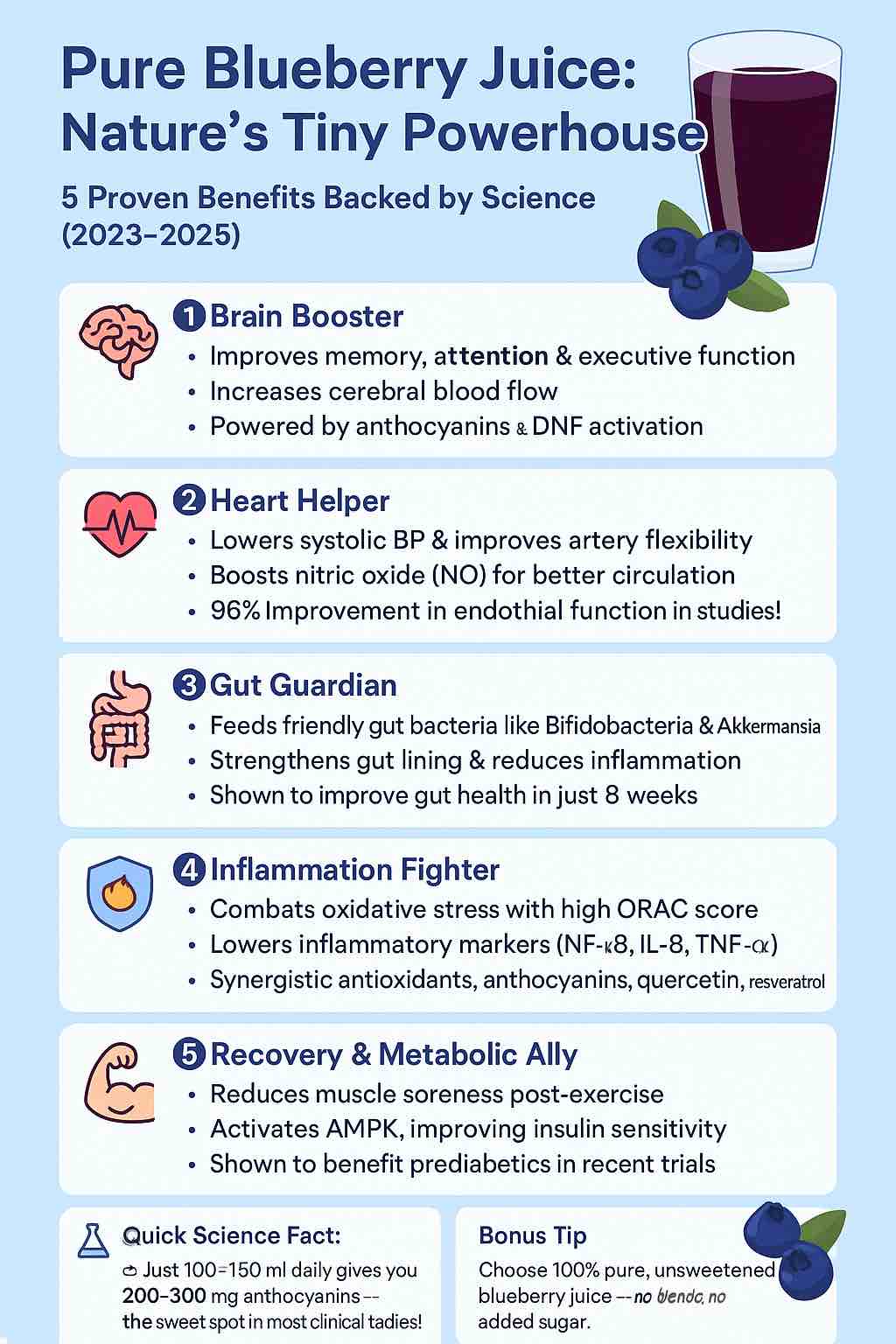
If you’re looking for a simple, delicious, and scientifically backed way to elevate your health, look no further than pure blueberry juice. Packed with potent antioxidants, anti-inflammatory compounds, and micronutrients, blueberry juice isn’t just another trendy superfood — it’s one of the most heavily studied natural health boosters out there.
In this deep dive, we’ll explore five powerful ways pure blueberry juice supports your well-being, backed by cutting-edge research from 2023–2025. Along the way, you’ll also get actionable tips on how to incorporate it into your routine for maximum benefit.
1️⃣ Brain Health & Cognitive Function: Nourish Your Mind
We all want to stay sharp as we age — and blueberries may be one of nature’s most effective brain foods.
🔬 The Science:
- Anthocyanins, the pigments that give blueberries their vibrant color, are able to cross the blood-brain barrier.
- They stimulate the production of BDNF (Brain-Derived Neurotrophic Factor) — essentially “fertilizer” for your neurons.
- Blueberry compounds reduce brain inflammation by calming overactive microglial cells.
- They also improve neurovascular coupling, enhancing blood flow to key brain areas involved in memory and decision-making.
🧪 Recent Studies:
- The BluFlow Trial (2023, UK) showed that 12 weeks of daily blueberry supplementation improved memory and executive function in older adults while increasing cerebral blood flow.
- A 2025 meta-analysis of 30 randomized trials confirmed significant improvements in cognitive performance, particularly in short-term memory, attention, and processing speed.
💡 Practical Takeaway:
- For cognitive benefits, aim for ~200-300 mg of anthocyanins daily — about 100-150 ml of pure blueberry juice.
- Consistency is key: daily use over several weeks yields the most noticeable brain-boosting effects.
2️⃣ Cardiovascular Health: Love Your Heart
Heart disease remains a leading cause of death globally, but nature may offer us a delicious ally.
🔬 The Science:
- Blueberries improve endothelial function, allowing blood vessels to relax and dilate more effectively.
- They enhance nitric oxide (NO) production, improving arterial flexibility.
- Blueberry polyphenols help lower oxidative stress and prevent LDL oxidation — two major drivers of atherosclerosis.
🧪 Recent Studies:
- The BEACTIVE Trial (2023) found that daily blueberry consumption reduced systolic blood pressure and improved cholesterol profiles.
- A 2024 meta-analysis of 16 RCTs confirmed significant improvements in flow-mediated dilation (FMD), a strong marker of vascular health.
💡 Practical Takeaway:
- Even 50 ml of pure blueberry juice consumed before light exercise can produce acute improvements in arterial stiffness.
- For long-term cardiovascular support, aim for 100-200 ml of pure, unsweetened juice daily.
3️⃣ Gut Microbiome Health: Feed Your Inner Garden
The trillions of bacteria in your gut influence everything from mood to immunity. Blueberry juice can help nourish these tiny allies.
🔬 The Science:
- Polyphenols in blueberries serve as prebiotics — food for beneficial gut microbes.
- They increase populations of Bifidobacteria and Akkermansia muciniphila, both linked to healthier metabolism and reduced inflammation.
- Blueberry metabolites help strengthen the gut lining, improving intestinal barrier integrity.
🧪 Recent Studies:
- A 2024 study in Nature Reviews Gastroenterology found blueberry consumption significantly enhanced gut microbial diversity and reduced markers of leaky gut.
- The King’s College London (2024) study observed substantial microbiome shifts within just 8 weeks of daily blueberry intake.
💡 Practical Takeaway:
- Drinking 100 ml of pure blueberry juice daily can help support a healthier, more diverse gut microbiome.
- Consuming juice alongside meals rich in fiber may amplify its gut-health benefits.
4️⃣ Antioxidant & Anti-Inflammatory Power: Quench the Fire
Chronic inflammation underlies many modern diseases. Blueberry juice delivers a potent cocktail of antioxidants that help calm systemic inflammation.
🔬 The Science:
- Anthocyanins, quercetin, resveratrol, and vitamin C work together to neutralize free radicals.
- Blueberries suppress inflammatory markers like NF-κB, IL-6, and TNF-α.
- They boost the body’s natural antioxidant enzymes, such as superoxide dismutase (SOD) and catalase.
🧪 Recent Studies:
- A 2023 study in Journal of Agricultural Food Chemistry showed blueberry juice possesses one of the highest antioxidant capacities among fruits.
- A 2024 clinical trial in Cell Metabolism demonstrated that polyphenol-rich diets (including blueberries) significantly reduced systemic inflammation in overweight individuals.
💡 Practical Takeaway:
- Antioxidant effects occur even with moderate doses: 75-150 ml of pure blueberry juice daily can significantly lower oxidative stress.
- Pairing blueberries with healthy fats (like nuts or yogurt) may improve absorption of fat-soluble antioxidants.
5️⃣ Exercise Recovery & Metabolic Health: Recover Faster, Perform Better
Whether you’re a casual gym-goer or a serious athlete, blueberry juice can help reduce post-exercise soreness and support metabolic function.
🔬 The Science:
- Blueberry antioxidants minimize oxidative muscle damage and speed up tissue repair.
- They activate AMPK, a metabolic master switch that improves insulin sensitivity.
- Blueberry consumption is linked to improved glucose regulation and lower risk of type 2 diabetes.
🧪 Recent Studies:
- A 2024 sports nutrition trial found that blueberry supplementation reduced muscle soreness and strength loss after eccentric exercise.
- A 2025 study in Diabetes Care reported that regular blueberry consumption improved insulin resistance markers (HOMA-IR) in prediabetic adults.
💡 Practical Takeaway:
- To support exercise recovery, consume 100-200 ml of pure blueberry juice within 1 hour after physical activity.
- Regular intake may also help improve long-term metabolic health markers.
⚠️ A Quick Word on Quality
👉 Not all blueberry juices are created equal.
For maximum benefits:
- ✅ Choose 100% pure, unsweetened blueberry juice.
- ✅ Avoid juice blends with added sugars or fillers.
- ✅ Wild (lowbush) blueberries may offer even higher antioxidant content.
If cost is a factor, frozen blueberries blended into smoothies are an excellent, budget-friendly alternative.
🧮 Suggested Daily Blueprint
| Goal | Amount of Pure Blueberry Juice |
|---|---|
| General wellness | 75–150 ml |
| Brain & heart health | 100–200 ml |
| Exercise recovery | 150–200 ml post-workout |
| Gut health | 100 ml with meals |
🔑 Final Thoughts
Pure blueberry juice is one of the rare superfoods where the science matches the hype. Whether you want to boost brain power, protect your heart, nourish your gut, tame inflammation, or speed up recovery — this small berry delivers outsized benefits.
👉 Start small, be consistent, and give your body a few weeks to fully experience the effects.
Your future brain, heart, and muscles will thank you.
Disclaimer: Always consult your healthcare provider before making significant changes to your diet, especially if you have pre-existing conditions or take medications.
🔎 10 FAQs for Readers
1️⃣ How much pure blueberry juice should I drink daily?
For general wellness, 75–150 ml daily is sufficient. For targeted benefits (brain, cardiovascular, exercise recovery), 100–200 ml daily provides optimal anthocyanin levels supported by studies.
2️⃣ Can I substitute fresh or frozen blueberries instead of juice?
Absolutely! 100 grams of fresh or frozen blueberries roughly equal 50–75 ml of pure juice. Whole berries also offer fiber, which adds gut health benefits.
3️⃣ Is store-bought blueberry juice effective?
Yes, if it’s 100% pure, unsweetened blueberry juice. Avoid products labeled “blueberry cocktail,” “juice blend,” or those with added sugars and fillers.
4️⃣ Are there differences between wild and cultivated blueberries?
Wild (lowbush) blueberries tend to have 2–3x higher anthocyanin content than cultivated (highbush) varieties. Either type is beneficial, but wild varieties offer more concentrated antioxidants per serving.
5️⃣ Can blueberry juice help with high blood pressure?
Studies show that regular consumption can modestly lower systolic blood pressure and improve arterial flexibility. It works best when combined with a healthy diet and lifestyle.
6️⃣ Does blueberry juice help with cognitive decline or dementia?
Emerging research suggests long-term consumption supports memory, executive function, and cerebral blood flow, which may help slow age-related cognitive decline. However, it is not a cure or treatment for dementia.
7️⃣ Is blueberry juice safe for people with diabetes?
Yes — when consumed in moderation (100–150 ml), it may even improve insulin sensitivity. However, monitor your blood sugar and consult your healthcare provider if you have diabetes.
8️⃣ When is the best time to drink blueberry juice?
Morning or post-workout are ideal for antioxidant support and recovery. Pre-exercise intake may also enhance vascular and cognitive function.
9️⃣ Can children and pregnant women drink blueberry juice?
Generally yes, in moderate amounts. It’s a nutrient-rich option, but always consult your healthcare provider during pregnancy for personalized advice.
🔟 Does heating or pasteurization reduce blueberry juice benefits?
Some loss of anthocyanins occurs with heat processing, but many commercial pure juices retain significant bioactivity. Flash-pasteurized or cold-pressed options are ideal.










